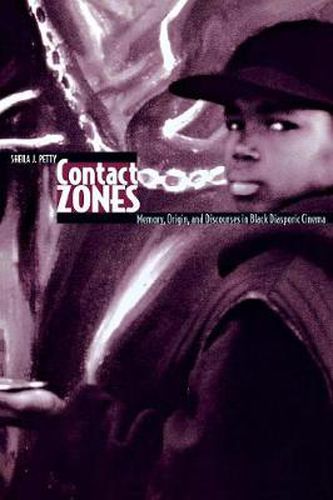Readings Newsletter
Become a Readings Member to make your shopping experience even easier.
Sign in or sign up for free!
You’re not far away from qualifying for FREE standard shipping within Australia
You’ve qualified for FREE standard shipping within Australia
The cart is loading…






This title is printed to order. This book may have been self-published. If so, we cannot guarantee the quality of the content. In the main most books will have gone through the editing process however some may not. We therefore suggest that you be aware of this before ordering this book. If in doubt check either the author or publisher’s details as we are unable to accept any returns unless they are faulty. Please contact us if you have any questions.
This title explores the contributions of black diasporic filmmakers and thinkers to contemporary artistic and theoretical discourses.Created at the crossroads of slavery, migration, and exile, and comprising a global population, the black diaspora is a diverse space of varied histories, experiences, and goals. Likewise, black diasporic film tends to focus on the complexities of transnational identity, which oscillates between similarity and difference and resists easy categorization. In
Contact Zones , author Sheila J. Petty addresses a range of filmmakers, theorists, and issues in black diasporic cinema, highlighting their ongoing influences on contemporary artistic and theoretical discourses.Petty examines both Anglophone and Francophone films and theorists, divided according to this volume’s three thematic sections - Slavery, Migration and Exile, and Beyond Borders. The feature films and documentaries considered - which include
Sankofa ,
Daughters of the Dust ,
The Man by the Shore , and
Rude , among others - represent a wide range of cultures and topics. Through close textual analysis that incorporates the work of well-known diasporic thinkers like W. E. B. DuBois, Aime Cesaire, and Frantz Fanon along with contemporary notables such as Molefi Kete Asante, bell hooks, Clenora Hudson-Weems, Rene Depestre, Paul Gilroy, and Rinaldo Walcott, Petty details the unique ways in which black diasporic films create meaning.By exploring a variety of African American, Caribbean, Black British, and African Canadian perspectives,
Contact Zones
provides a detailed survey of the diversity and vitality of black diasporic contributions to cinema and theory. This volume will be a welcome addition to the libraries of scholars and students of film studies and Africana studies.
$9.00 standard shipping within Australia
FREE standard shipping within Australia for orders over $100.00
Express & International shipping calculated at checkout
This title is printed to order. This book may have been self-published. If so, we cannot guarantee the quality of the content. In the main most books will have gone through the editing process however some may not. We therefore suggest that you be aware of this before ordering this book. If in doubt check either the author or publisher’s details as we are unable to accept any returns unless they are faulty. Please contact us if you have any questions.
This title explores the contributions of black diasporic filmmakers and thinkers to contemporary artistic and theoretical discourses.Created at the crossroads of slavery, migration, and exile, and comprising a global population, the black diaspora is a diverse space of varied histories, experiences, and goals. Likewise, black diasporic film tends to focus on the complexities of transnational identity, which oscillates between similarity and difference and resists easy categorization. In
Contact Zones , author Sheila J. Petty addresses a range of filmmakers, theorists, and issues in black diasporic cinema, highlighting their ongoing influences on contemporary artistic and theoretical discourses.Petty examines both Anglophone and Francophone films and theorists, divided according to this volume’s three thematic sections - Slavery, Migration and Exile, and Beyond Borders. The feature films and documentaries considered - which include
Sankofa ,
Daughters of the Dust ,
The Man by the Shore , and
Rude , among others - represent a wide range of cultures and topics. Through close textual analysis that incorporates the work of well-known diasporic thinkers like W. E. B. DuBois, Aime Cesaire, and Frantz Fanon along with contemporary notables such as Molefi Kete Asante, bell hooks, Clenora Hudson-Weems, Rene Depestre, Paul Gilroy, and Rinaldo Walcott, Petty details the unique ways in which black diasporic films create meaning.By exploring a variety of African American, Caribbean, Black British, and African Canadian perspectives,
Contact Zones
provides a detailed survey of the diversity and vitality of black diasporic contributions to cinema and theory. This volume will be a welcome addition to the libraries of scholars and students of film studies and Africana studies.